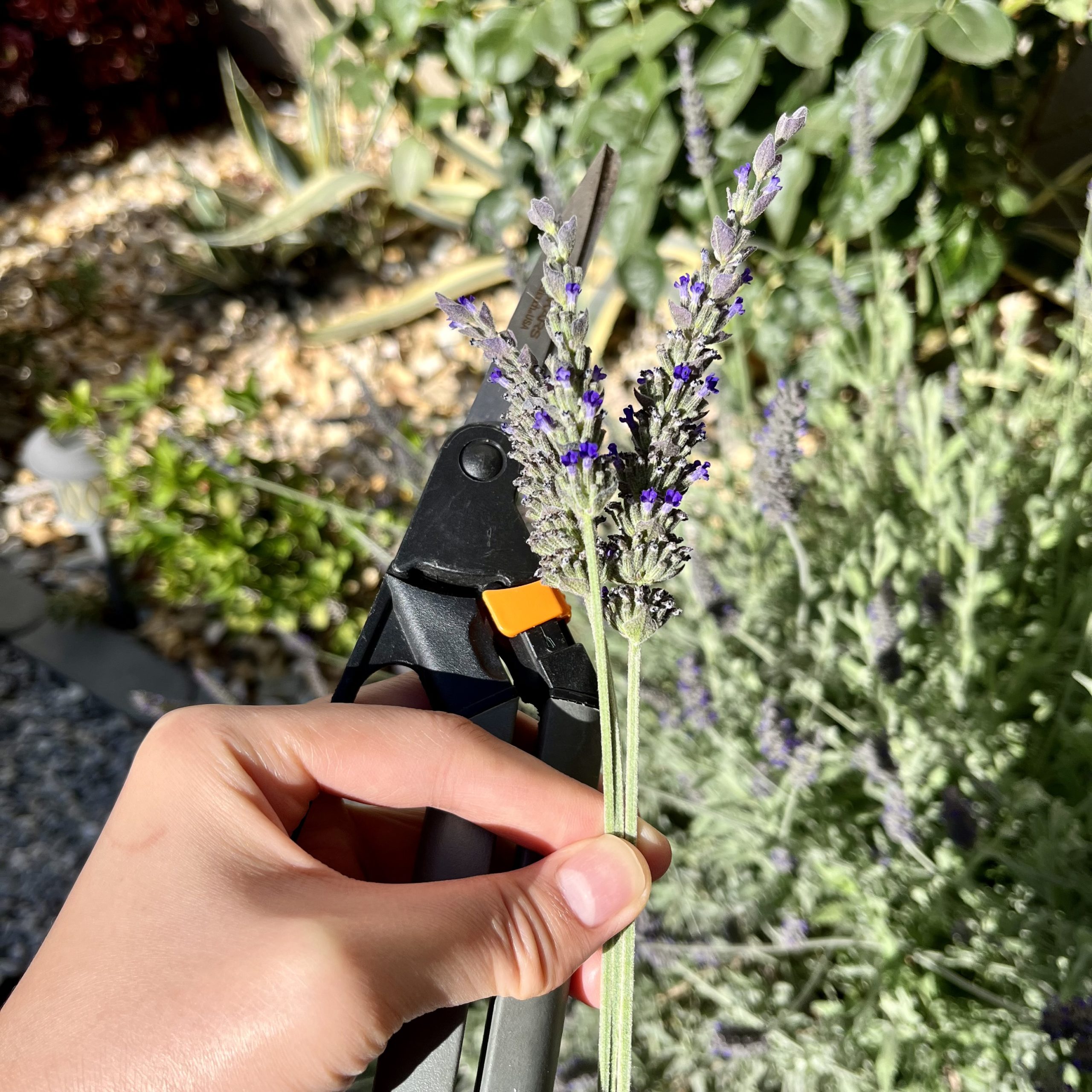Harvesting fresh English lavender to make tea


In proper Swiftie fashion, I have been in a lavender haze lately. That’s to say, the English lavender I’ve been harvesting from the garden has had quite the soporific effect on me as a tea. Or maybe the trials and tribulations of adulthood have just left me in a perpetual state of drowsiness over the past few weeks. In any case, I’ve been feeling sleepy…very sleepy.
How to care for lavender
Whether it’s incorporated into a sickly sweet Bath and Body Works lotion or a fancy latte, lavender is one of my favorite herbs, and it grows so readily in zone 9b. We’ve had a prolific English lavender bush for years in the yard, even through the worst bouts of the drought in California. It’s such a heat- and drought-tolerant perennial plant, generous in its lush bloom cycles and low maintenance in its watering and fertilizing needs. And I’d be remiss not to mention its beautiful herbaceous fragrance! The only thing I dislike about lavender is how it always seems to be surrounded by a swarm of bees. But as much as they freak me out, I can’t really hate on the pollinators.
In search of ways to fill my time this past weekend, I decided to take advantage of our English lavender plant in bloom. (We also have a few Spanish lavender plants, which, while gorgeous with their deep purple flags, are not particularly fragrant). Typically, I’d dry the blossoms and enjoy the dried flowers around in the house, but I wanted to be more adventurous this time and decided to turn them into tea! I’ve religiously bought Yogi Stress Relief Tea in the past, but it’s now so easy to make lavender tea from my home garden.
Lavender tea is one of my favorite teas but its commercial combination with chamomile is always such a turn-off — chamomile simply tastes like grassy, dirty perfume to me! So, I took matters into my own hands and used fresh lavender blooms to make tea sans the chamomile. And yes, the end result pretty much tastes like flower water (like super diluted Lovely by Sarah Jessica Parker), but at least it’s not flower water and grass. (Apologies if you are a chamomile herbal tea enthusiast who came across this blog.)
When and how to pick lavender to make tea
The best time to pick lavender is when roughly half or more of the flowers are blooming — this is when the oil is most potent and fragrant. You want to cut down to the first or second set of leaves but never actually reach any woody stem parts. I cut around 15 stems and set aside two-thirds of my harvest to hang dry.
You’re supposed to dry lavender bundles in a dark, cool space to maintain the vibrant purple color, but I have my bunch hanging off the switch of my Target lamp that I keep by the window. I also used plain acrylic Red Heart yarn to tie the ends, but you can, of course, pick up proper twine for a more rustic arrangement.
Making fresh lavender tea from flowers
For my fresh lavender milk tea, I gathered three fresh lavender stems, plucking off individual blooms and a few leaves. For my own peace of mind, I ran the stems under water just as I would when washing my fruits and veggies — we don’t treat our lavender with pesticides, but I’d still like to wash off anything icky.
Here’s how I go about steeping my lavender tea: I added the lavender buds and leaves into a stainless steel mesh infuser, which I steeped in two cups of boiling water with a Twinnings black tea sachet. Then, I poured about half a cup of warm milk into the concoction — et voila, a calm, relaxing hot drink to enjoy with a tasty dessert after a hearty meal or during an afternoon tea session! Even with the black tea, I conked out a mere two hours after drinking this…
I also just wanted to drink lavender blooms straight up. The following day, I repeated everything above but skipped the hot milk and black tea. Fresh lemon and honey would go great with this lavender tea, but it’s honestly quite refreshing all on its own! The color caught me by surprise, honestly — it’s a grayish, barely there tint, but I expected it to be a bit yellowed. Perhaps if I had dried my lavender buds, my drink would have a bit more color.
I’m now typing this as I sip on an iced lavender tea with a scoop of honey citron ginger — it’s not too bad, actually! (But the flavor is definitely subdued by the ginger.) I’m eager to try making a matcha lavender tea soon. After that, my next lavender endeavor will probably follow less of a culinary route — I’m thinking of pressing the flowers and leaves in my parents’ garden next!
Recent Posts
A recap of the Manteca Antique Fair
You’d think there wouldn’t be much going on in a city named after lard, but…
7 thrifted Valentine’s Day gift ideas
As a singleton over the last few years, I haven’t given Valentine’s Day much thought.…
Estate sale tips & tricks: Everything you need to know about shopping at estate sales
Not to brag, but I’ve been shopping secondhand since my time in the womb. When…
How to ship vintage wares safely: Tips for sending glass and porcelain items in the mail
This holiday season, I’ve been cutting down boxes as much as I’ve been clickety-clacking away…
The life-changing magic of OxiClean White Revive: Cleaning thrifted clothes with OxiClean
As the patron saint of germaphobes, it’s kind of a miracle that I more or…
The trials and tribulations of cleaning a thrifted sweater: How to clean a secondhand wool sweater
Throughout my thrifty adventures over the years, there’s been one sweater material that I’ve actively…